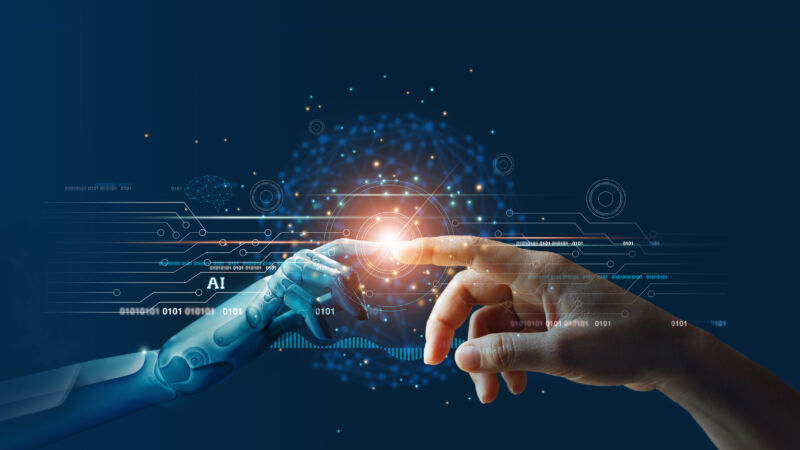42% of the workforce fear AI will replace them in the workplace
It’s no surprise that many people are concerned about AI coming for their jobs.
Major firms have revealed plans to give AI an increasingly prominent role in their operations.
In May, IBM’s Chief Executive Arvind Krishna revealed that the firm expects to pause hiring for new roles, alongside plans to replace roughly 7,800 jobs with AI systems and in the same month, TALiNT International reported that BT would be slashing 55,000 jobs and that up to a fifth of these roles could be replaced with AI.
However, one leader has raised a few eyebrows by replacing the vast majority of his employees with AI and facing the wrath of the internet as a result.
Fortune reported that Suumit Shah, Founder of an India-based AI app called Dukaan, took to Twitter with boasts about how he had streamlined his business by replacing 90% of his customer support team with chatbots.
Despite admitting the decision was ‘tough’ but ‘necessary’, he bragged to the world that his app’s response time to user queries had been slashed by 85% after ousting his human employees in favour of the bots.
Shah wrote: “Given the state of economy, startups are prioritising ‘profitability’ over striving to become ‘unicorns,’ and so are we.
“It’s less magical, sure, but at least it pays the bills.”
Shah was clearly expecting a wave of praise for his money-saving scheme and tech savviness, but has instead faced a huge backlash over his decision.
One Twitter user responded: “It’s a sad day for the Indian startup community. Founders are more interested in writing viral threads and hooks to get followers than having basic human sensitivity towards their employees.”
Another commented: “I hope people choose wisely before working with founders who have 0 empathy and like gloating about their layoffs.”
Another added: “Companies need to make more profit and we get that… but glorifying layoffs to promote your new AI tool and brag about growth? Gives a really eerie, foreboding feeling.”
Employees concerned about losing their jobs to AI
The leap forward in AI technology has for months been the subject of divisive discussion among professionals.
Whilst tools such as ChatGPT are pushing the boundaries of technology’s place in society, the ramifications for the future of human-centric jobs remains largely unknown. And whilst experts have insisted that such tools are there to assist humans, not replace them, it seems that a huge portion of the workforce simply don’t believe this to be true.
In fact, a massive 42% of professionals believe that AI will replace jobs in their area of work, according to data from AtlasVPN.
It’s true that AI tools already help automate tasks, collect and analyse data, create graphic designs, or handle basic customer queries, yet many fear that the ability to scour masses of data at lightning speed and process it into reports or event copy will effectively make humans redundant.
It’s not just the average worker who has shared anxieties around AI’s future. Elon Musk – Tesla CEO and OpenAI co-founder – alongside a group of artificial intelligence experts and industry executives, are calling for a six-month pause in developing systems more powerful than OpenAI’s newly launched GPT-4, citing potential risks to society.
Clearly, the concern of 42% of the workforce isn’t for nothing.
However, it must be noted that a similar percentage (39%) of people disagree that AI will overtake their work. Some jobs still require a physical intervention of a person and, at the moment, cannot be replaced by AI.
Nearly a fifth (19%) of professionals also felt neutral about AI replacing them in their work. Yet, some people may not be fully aware of the extent to which AI could automate their tasks.
A further two-thirds (67%) of people feel optimistic about the benefits AI can bring to society. In addition, 60% of respondents express excitement about AI technology.
Is swapping workers for AI a wise move?
While AI technologies do have the potential to drastically transform the world of business, CEO and co-founder of Factorial believes to deliver significant impact companies will always require human skill, knowledge, and empathy – capabilities that AI (at least currently) does not have.
Jordi Romero, Founder and CEO at Factorial, explained why it’s crucial that businesses intersect the unique capabilities of both AI and HR to deliver significant, positive impact.
“While AI technologies are nothing new, ChapGPT’s rapidly growing popularity, due to its high-performance level and wide range of applications, looks set to transform the world of business,” said Romero.
“The AI Assistant market is now poised for record growth in 2023 as more companies than ever recognise its competitive advantage and flock in droves. We are truly on the brink of a new tech revolution.
“This is particularly true for the world of HR, where HR managers now have the power to quickly and easily improve the way they manage everything from staff retention to career development and recruitment.
“ChatGPT has shown the enormous potential for these technologies to not just drive efficiencies and streamline operations, but also impact other considerations such as removing barriers to progression; improving equality, diversity and inclusion efforts by ensuring a fairer and more level playing field; and personalising the employee experience to help every individual reach their full potential.”
Romero concluded: “Contrary to popular belief, the tech will also allow companies to focus more on people than process by freeing up valuable resources and time, giving HR managers the flexibility to shift attention to aspects such as brand development, embedding company values and goals, and boasting innovation. We believe the greatest is yet to come.”










